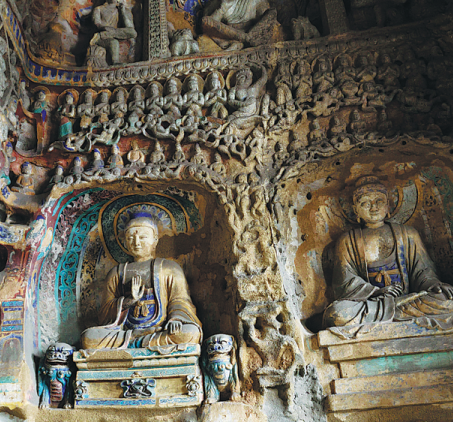24 Hours Hotline: +86 137-3541-1378
Email:xian@tripstoshanghai.com
24 Hours Hotline: +86 137-3541-1378
Email:xian@tripstoshanghai.com

Zhang Xiaoqin, Wang Nan lead online class on Chinese Cultural and National Heritage Day
It is almost impossible for tourists to get a group of renowned history and cultural heritage experts as their guides when visiting Yungang Grottoes, one of the most renowned sites in North China's Shanxi province.
However, on the fourth Chinese Cultural and Natural Heritage Day, which was celebrated on June 13, two famous experts on ancient Chinese culture from Tsinghua University, Zhang Xiaoqin and Wang Nan, hosted an online show at Yungang Grottoes in Datong city. More than 2 million viewers logged on to explore this famous Buddhist cultural asset as well as other heritage sites in the rest of Shanxi.
Shanxi is one of the provinces and regions in China with the largest number of cultural sites. Yungang Grottoes is representative of all the ancient cultural assets in Shanxi.
Located at the southern foot of Wuzhou Mountain, some 16 kilometers west of Datong's city center, Yungang Grottoes was carved out of the mountainside and extends about 1 km from east to west.
Comprising 252 caves and 51,000 statues within an area of 18,000 square meters, Yungang Grottoes represents an outstanding achievement of Buddhist cave art in China during the 5th and 6th centuries.
A classical masterpiece of Chinese Buddhist art, Yungang Grottoes played an important role among early Oriental Buddhist grottoes with a far-reaching effect on Buddhist cave art in China and East Asia.
Yungang Grottoes was added to the World Cultural Heritage List in December 2001.
During the online show, the two experts led the viewers into a thorough study of the precious cultural wealth in Yungang from a unique perspective, as the theme of the show indicated: "Following the Footsteps of Liang Sicheng and Lin Huiyin to explore China's Ancient Architecture and Arts".
Liang and his wife, Lin, were among the founders of the Society for the Study of Chinese Architecture.
In the first five years after its establishment in 1932, society members conducted a great deal of field research throughout the country.
While their trips covered a great many areas in Shanxi, Liang said his experience in Yungang Grottoes was the most impressive.
Wang Nan is also the deputy curator of the Memorial Museum for the Society for the Study of Chinese Architecture. He said the reason why the grottoes impressed Liang and Lin so much is that a study of the site is crucial to understand how Buddhist culture was spread in China.
Using pictures and videos, Wang showed many details of statues and structures of the grottoes. For instance, the various gestures of the Buddha and transformation of clothing styles.
"Judging from the clothing style, Buddha statues built in an earlier stage feature characteristics of India, Persia, Central Asia and even Greece.
"Later there was an evolution to adapt to the Chinese culture, featuring loose robes, broad belts and slim bodies," Wang said.
Flying Apsaras are the common images in China's three most renowned grottoes sites: Mogao in Dunhuang, Gansu province; Yungang in Datong; and Longmen in Luoyang, Henan province.
Apsaras refer to spiritual beings in Hindu and Buddhist cultures taking the form of beautiful females.
In Yungang, according to Wang, the Apsaras carved in an earlier period were usually full-grown women, just as those in Hindu or Indian Buddhist cultures. They became slender gradually, more resembling the immortals of China's native legends.
Wang said it is because of the transformation of such details that Liang reached a conclusion: Chinese architectural culture maintained its unique characteristics independent from other cultures, despite having absorbed foreign ingredients during the past two millennia.
In one of his research reports, Liang said: "To enthusiasts of the ancient Chinese carving and sculpture arts, Yungang was the most exciting site."
He reached the conclusion because he discovered the construction of the grottoes involved the participation of different segments of society.
When Datong-then called Pingcheng-served as the capital of the Northern Wei Dynasty (386-534), most people were faithful Buddhists. In addition to the royal family and the imperial court, common people were allowed to create caves and carve Buddha statues in Yungang, according the report. It added that the enthusiasm and creativity of those people had lifted Buddhist arts to a new height.
Liang and Lin's research trips in Shanxi also brought a lot of ancient structures to light.
These included the Nanchan and Foguang temples-the country's oldest buildings-in the Wutai Mountains; and the Sakyamuni Pagoda in Yingxian county, the oldest wooden structure in China.
Guo Yanjie contributed to this story.
----------------From China Daily
Prev: Space for new discoveries - Dunhuang Silk Road Travel News
Next: Five Xi’an Coffee Shops to Sort out Your Caffeine Fixes
Wechat: Chinaprivatetour
24 Hours Hotline:
+86 137-3541-1378
* Authentic Experiences: Genuine local experiences that immerse you in the true essence of Xi'an and beyond.
* Safety First: Highest safety standards with secure activities and reliable transportation.
* Customizable Tours: Flexible itineraries tailored to your interests and needs.
* Local Expertise: In-depth knowledge of Xi'an and China, offering exclusive insights.
* Professional Guides: Licensed bilingual guides with over 5 years of experience.
* Comfortable Travel: Experienced drivers and well-maintained vehicles for a smooth journey.
* Sustainable Tourism: Commitment to responsible tourism and supporting local communities.
* Customer-Focused: Personalized service and continuous improvement based on your feedback.
* Free Cancellation: Cancel up to 24 hours before travel for flexibility and peace of mind.
* 24/7 Support: Round-the-clock assistance for any questions or help needed.
(Your Privacy is Protected)
1 to 1 tailor-made service from our professional travel advisors for the most sophisticated
Constantly excellent reviews for attraction, hotel and service Competitive price
Local experts provide quality tours Best selected knowledgeable local guides Authentic local restaurants
7*24 hours available to create you a worry-free tour. No Hidden Fees and absolutely no pressure to buy. Secured









Copyright © 2017 www.xianprivatetour.com All rights reserved. 浙ICP备18056007号-6